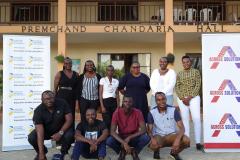Coping With COVID-19: Researching Resilience In Young 'agripreneurs'
When the COVID-19 pandemic hit Kenya, it exacerbated two familiar issues for young entrepreneurs in the agriculture sector: resilience and inequalities, particularly gender inequality.
That is the main finding of a study led by the United States International University (USIU)-Africa through the Cultivate Africa’s Future initiative (CultiAF). CultiAF is a 10-year, CA$35-million partnership between IDRC and the Australian Centre for International Agricultural Research (ACIAR).
The USIU-Africa study – funded as part of IDRC’s response to COVID-19 - focused on so-called agripreneurs, young smallholder farmers in Kenya who receive training and support through CultiAF. Researchers wanted to better understand the factors that allow young people to be more resilient and to keep their agribusinesses afloat.
“This rapid-response initiative to document changes in real time is part of our efforts at IDRC to help inform recovery of policies and reorganizing of food systems during the current crisis but also to help us prepare for future shocks,” said Kathryn Toure, IDRC Regional Director, Eastern and Southern Africa.
In the latter half of 2020, researchers collected data from 500 selected respondents via email, WhatsApp, and phone through monthly monitoring and recording of resilience indicators. Resilience was investigated from two angles – first, personal resilience including time spent networking, spending on promotions, confidence, and changes made to business plans. Second, business resilience was examined by reviewing the participants’ customer base, sales, jobs, employee welfare, product lines, outlets, and technology adoption.
Study results reveal pandemic consequences on resilience, inequalities
The results of the USIU-Africa study showed that the shock of the pandemic reduced sales and incomes, prompted job cuts, disrupted supply chains, and forced business closures in the sector. The research also revealed an outsized impact on female business owners.
In November 2020, 366 of the 500 selected respondents, or 73%, were still in business, but by January 2021, only 260, or 52%, were in business, suggesting that 48% of respondents had lost their businesses since July 2020. Of the 366 respondents who remained in business in November 2020, 264 were men and 102 were women and most had high school educations.
More than 90% of respondents reported being unprepared for the COVID-19 crisis.
“I never thought anything like this could happen in my lifetime,” said Kelly Kadiviria, an agripreneur from Kenya’s Kakamega County.
Over the course of the study period, the average entrepreneur laid off two workers and reduced spending on wages.
“I could no longer afford to keep them [employees]… I just had to let them go,” said Jared Omondi Andego from Kisumu County.
Female entrepreneurs in the study faced a higher likelihood of business failure.
“Our sales decreased sharply…I used to make an average of KSh6,000 [CA$68.46] a week, now I can hardly make half that,” said Benedetta Nangila, a fodder farmer from Bungoma County.
Supporting pandemic resiliency and sustainability: what worked
The study identified steps taken by entrepreneurs who have so far managed to keep their businesses afloat through the pandemic. They were more likely to spend time networking, seeking advice and funds, and made greater use of social media to boost sales. Diversifying their business was also a key to sustainability. Many of these measures were reinforced by training offered by USIU-Africa.
“Because of the pandemic, the income is less and varies, but I was able to check on my costs. I was not doing that before the [USIU-Africa] training,” said Samuel Thuo Irungu, a potato entrepreneur from Nairobi County.
Through CultiAF, the training provides young farmers aged 18-35 years old with access to business training, finance, and mentor support.
The study findings also underscored the role of government stimulus packages in supporting the resilience and sustainability of agribusinesses impacted by COVID-19. Stimulus measures range from business licenses, seeds and other inputs, agricultural services, and greater access to diversified markets and marketing channels. Capacity-strengthening measures for entrepreneurs, especially youth, also support resiliency and sustainability.
Originally published by IDRC




